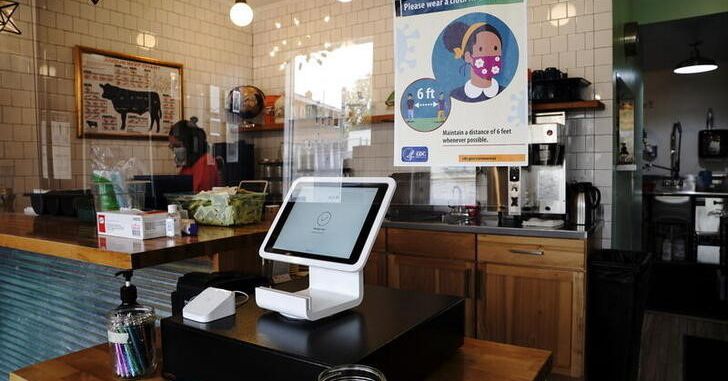[ad_1]
Plastic barriers and signage encouraging mask use and social distancing, as the coronavirus disease (COVID-19) outbreak continues in Madison, Wisconsin, U.S., October 19, 2020. REUTERS/Bing Guan
Register now for FREE unlimited access to Reuters.com
(Reuters) – Wisconsin’s highest court on Wednesday became the third state top court in a row to rule that businesses are not entitled to insurance coverage for losses resulting from the COVID-19 pandemic and government-imposed restrictions on gatherings.
The Wisconsin Supreme Court ruled that neither indoor dining restrictions nor the presence of the virus within restaurants like Colectivo Coffee Roasters triggered coverage under property insurance policies issued by Society Insurance.
The unanimous decision reversed a February 2021 ruling by a Milwaukee judge who allowed Colectivo to proceed with a proposed class action on behalf of businesses insured by Society seeking coverage for financial losses under several clauses of the policies, including for business-income interruption.
Register now for FREE unlimited access to Reuters.com
But Justice Rebecca Frank Dallet, writing for the 7-0 court, said Milwaukee-based Colectivo, which operates a chain of cafes, had failed to allege that the presence of COVID-19 particles or the loss of the use of its properties created a “tangible harm” necessary to trigger coverage.
Citing the “overwhelming majority” of courts that have ruled in similar cases, Dallet said the presence of COVID-19 cannot constitute a physical loss of property or damage to it because the virus does not alter a property’s appearance or structure.
She said emergency orders the Wisconsin Department of Health Services issued starting in March 2020 at the onset of the pandemic that prohibited in-person dining to slow the spread of the coronavirus likewise did not qualify under Society’s policy as a physical loss of property.
“One may think of the business-income provision as indirect loss-of-use coverage, but that does not change the fact that a prerequisite for that provision is still a direct physical loss or damage,” Dallet wrote.
Heidi Vogt, a lawyer for Society at von Briesen & Roper, in a statement said the “well-reasoned ruling should serve as another step toward bringing this litigation to an end.”
Jay Urban, a lawyer for Colectivo at Urban & Taylor, did not respond to a request for comment.
The ruling followed a string of similar decisions by courts nationwide rejecting efforts by businesses to force insurers to cover the billions of dollars in losses they suffered following lockdowns and other restrictions prompted by the pandemic.
Most rulings came from federal courts interpreting state insurance laws, and lawyers for businesses have urged state supreme courts to turn the tide and rule for them.
But in April, the top courts of Massachusetts and Iowa reached the same conclusion as the Wisconsin Supreme Court in interpreting property insurance policies by other insurers.
The case is Colectivo Coffee Roasters et al. v. Tandem Restaurant et al., Wisconsin Supreme Court, No. 2021AP000463.
For Colectivo et al.: Jay Urban of Urban & Taylor and Richard Schulte of Wright & Schulte
For Society Insurance: Heidi Vogt, Beth Kushner, Janet Cain, and Christopher Avallone of von Briesen & Roper; Laura Foggan of Crowell & Moring
Read more:
Society Insurance, restaurants take COVID-19 coverage war to Wisc. high court
Iowa top court latest to reject insurance coverage for COVID biz losses
In a first, Massachusetts top court rejects insurance for COVID business losses
Register now for FREE unlimited access to Reuters.com
Our Standards: The Thomson Reuters Trust Principles.
[ad_2]
Source link








